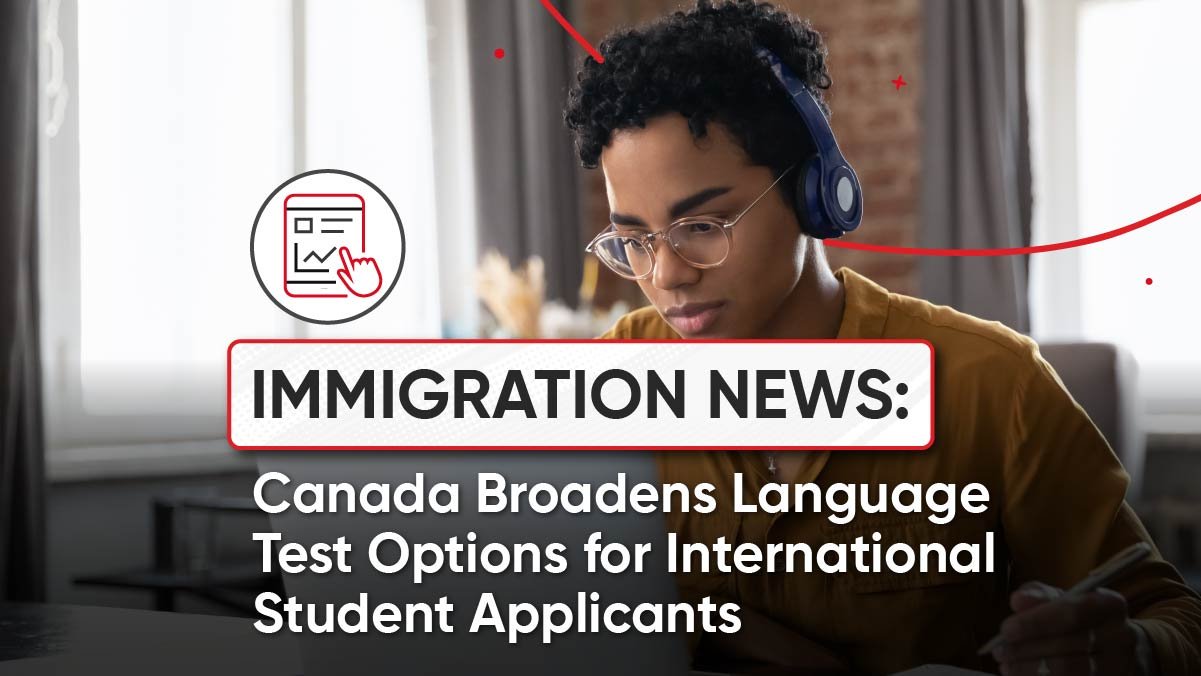In a significant move to streamline the application process for international students, Immigration, Refugees and Citizenship Canada (IRCC) has introduced a range of newly approved English language tests for applicants under the Student Direct Stream (SDS) program. Effective August 10, 2023, these changes aim to provide a more convenient approach for prospective students looking to study in Canada. With such an important decision, IRCC further published the criteria it uses to choose a designated language test.
Canada’s New Language Tests for SDS
The recent update introduces four additional English language proficiency tests to the list of approved options for SDS applicants. These tests include:
- The Canadian English Language Proficiency Index Program (CELPIP) General
- Canadian Academic English Language (CAEL)
- Pearson Test of English (PTE) Academic
- The Test of English as a Foreign Language Internet-Based test (TOEFL iBT).
This expanded range of choices offers applicants greater flexibility in demonstrating their language abilities.
Previously, the International English Language Testing System (IELTS) General Training or Academic tests were the primary accepted language assessments for SDS applications.
However, IELTS requirements have also undergone alterations as of August 10, 2023.
- For applicants using IELTS Academic, an overall band score of 6.0 is now required.
- Those who applied with IELTS Academic before this date needed a score of 6.0 in each skill section.
- IELTS General Training applicants are still required to achieve a score of 6.0 in each skill section, regardless of the application date.
To meet SDS eligibility criteria, applicants must demonstrate proficiency in an official language of Canada (English or French), with competencies in speaking, listening, reading, and writing.
Achieving specific scores is essential, with minimum totals as follows:
| Language Test | Minimum Score |
|---|---|
| CELPIP General | 7 |
| CAEL | 60 |
| Pearson Academic | 60 |
| TOEFL iBT | 83 |
It's worth noting that these tests must be taken in-person, as online or remotely proctored tests are not considered for SDS applicants.
Meeting SDS Requirements
The Student Direct Stream, launched to expedite the processing of study permit applications, is designed to benefit international students from select countries. The program, striving for a processing timeframe of 20 calendar days, caters to students from countries including:
- Antigua and Barbuda
- Brazil
- China
- Colombia
- Costa Rica
- India
- Morocco
- Pakistan
- Peru
- Philippines
- Senegal
- Saint Vincent and the Grenadines
- Trinidad and Tobago
- Vietnam
SDS applicants are required to fulfill several criteria, including a legal residency in eligible countries, acceptance by a Canadian Designated Learning Institution (DLI), a medical exam, possession of a Guaranteed Investment Certificate (GIC) worth 10,000 CAD, payment of first-year tuition fees, proof of language test results within two years, and submission of their application at a Visa Application Centre (VAC).
However, please note that even if these eligibility requirements are met, an IRCC officer may still reject an application if it lacks sufficient evidence of the student's ability to fulfill their obligations during their stay in Canada.
The success of initiatives like the Student Direct Stream has propelled Canada to become a premier destination for international students. In fact, as of the end of 2022, the country hosted over 800,000 international students – a remarkable increase from just over a decade ago.
Factors driving this growth include a proactive approach by Canadian authorities and DLIs to attract international students for their contributions to the economy, diversity, and cultural enrichment. Additionally, a global rise in middle-class populations seeking quality education and future immigration prospects has boosted Canada's appeal as an educational hub.
How IRCC Chooses Language Tests
To ensure consistent language proficiency standards, IRCC recently unveiled the criteria that language testing organizations must meet to receive IRCC designation. Language tests are vital to economic class permanent residence applications and the Student Direct Stream, as they gauge a candidate's potential to integrate into Canadian society.
These language test scores also influence candidates' human capital scores, which are used to rank candidates within federal and provincial pathways. For instance, higher-ranking candidates are prioritized for permanent residence invitations under the Express Entry system.
IRCC's criteria encompass expertise in evaluating language skills, score reliability, security measures, and test availability. These criteria ensure that designated testing agencies maintain consistent standards and offer reliable assessments.
| Criteria | Description |
|---|---|
| Expertise | Evaluate proficiency in reading, writing, listening, and speaking in functional English/French across all proficiency levels. |
| Reliability | Ensure consistent scores among candidates of similar language proficiency. Maintain consistent difficulty levels across test versions. |
| Integrity/security | Meet security standards for logistics, registration, test writing, marking, and result dissemination. Employ anti-fraud mechanisms. |
| Availability | Make tests accessible to applicants across Canada and abroad with sufficient demand for third-party language testing. |
Currently, five language testing agencies are approved by IRCC for economic class immigration: CELPIP General, IELTS General Training for English; TEF Canada, TCF Canada for French, and soon; the Pearson Test of English (PTE).
Canada's recent updates to language testing requirements for the Student Direct Stream reflect the nation's commitment to welcoming international students and simplifying their pathways to study in the country.
Incorporating additional English language tests alongside the revised IELTS requirements offers more opportunities for applicants to demonstrate their language proficiency. As Canada continues to lead in international education, these changes are poised to enhance the educational experience for students worldwide further.
To stay updated on more of our weekly news and the latest developments in immigration and citizenship matters, be sure to follow us on social media and subscribe to our Youtube channel.




